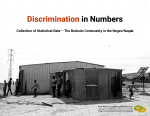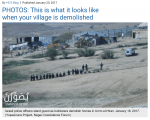
Negev Coexistence Forum for Civil Equality
פורום דו-קיום בנגב לשוויון אזרחי
منتدى التعايش السلمي في النقب من أجل المساواة المدنية
International Update | February 15, 2017
New data collected by NCF reveals ongoing discrimination against the Bedouin community
Last month, NCF published Discrimination in Numbers – Collection of Statistical Data, a report that presents the wide gaps between the Bedouin community and the general society, across a variety of fields, including education, employment, socioeconomic indicators, planning and more.
Click here for the full findings
NCF’s Recognized Project has released new videos from the Negev/Naqab
With a growing group of volunteer photographers from the Bedouin unrecognized villages, NCF’s Recognized Project is proud to present the latest videos filmed by its members:
The video was filmed by Sa’id Gabo’ah, a resident of the village of al-For’ah, a village which faces the threat of demolition. While in 2006 the government decided to recognize al-Fur’ah, its planning process was stalled to make way for a phosphate mine (Sdeh Barir). Decisions of Israeli planning committees regarding the national plan for mining and quarrying zones, may sentence the village to demolition without even discussing its existence. Watch and share on Facebook
The video was filmed by Yassin al-Nabari, a resident of the unrecognized village of Tal Arad. Bedouin villages in the Negev/Naqab are not connected to the electricity grid. The video explains how residents produce electricity on their own, and shows how the village ‘disappears in the dark’, due to the lack of electricity. Watch and share on Facebook
>> Click here for more videos on the NCF website
Israeli Government approves 5-year socio-economic development plan for the Bedouin community
Last Sunday, the Israeli government voted in favour of a 5-year plan to invest NIS 3 billion in the promotion of the Bedouin community. While the plan involves some very positive components, it includes two main problems. First of all, the plan totally disregards the residents of the unrecognized villages (about a third of the Bedouin community), as all budgets are designated to be invested in the recognized towns and villages. Secondly, the plan ties investment in socio-economic matters to the enhancement of “enforcement against illegal construction”, which is already allotted a huge budget. Strengthening this aspect of governing the Bedouin, contributes to pressuring more Bedouin citizens to relocate to the recognized towns and villages. The conditional nature of financial support will deepen the grievances of the Bedouin community, instead of leading to a just and acceptable solution, which could be sought by cooperation between the government and its own citizens.
NCF’s Yuṣawiruna Project Photos Featured on +972 Magazine and Presented in the Lush Summit in London
During the violent house demolitions in the village of Umm al-Hiran on January 18th, one woman from the village took her camera, went up on the roof, and documented the events from her perspective. This woman, who chose to remain anonymous, is a member of our project – Yuṣawiruna – Photographing for Human Rights. The project involves groups of women in various unrecognized villages, documenting their daily lives, including human rights violations. The women study together, learning about human rights and photography.
We invite you to view her photos, and read the short text she wrote about the tumultuous events that took place in Umm al-Hiran >> PHOTOS: This is what it looks like when your village is demolished, +972 Magazine, 23 January 2017
Last week, an exhibition of photos from the Yuṣawiruna project was presented at the Lush Summit in London. The exhibition which focuses on the lack of services and infrastructure in the unrecognized Bedouin villages, included photos by dozens of members of the project: women from a variety of villages.
Click here for photos from the event
Shin Bet “kidnaps” Bedouin activists from the street, preventing them from participating in the funeral of Ya’aqub Abu al-Qian
On the morning of the January 24th, three private cars blocked the vehicle of three know Bedouin activists from the Negev/Naqab, in the middle of Be’er Sheva, near Ben Gurion University. The activists were detained and taken to an empty parking lot in the outskirts of the city, and later moved to a Shin Bet facility, near the Shoket intersection. The three were interrogated by Shin Bet agents on a variety of matters, none of which would justify such an unconstitutional arrest. At the time of the arrest, the funeral of Ya’aqub Abu al-Qian, the resident of Umm al-Hiran who was killed by police during the demolition on January 18th, was being held. This is the only possible indication for why the arrest may have taken place: to deny these activists access to grieve with their community.
This arrest is only one in an ongoing list of arrests and interrogations of human rights and political activists in the Negev/Naqab. The fact that Shin Bet followed these individuals and made an arrest in the middle of the street, along with the fact that ongoing attempts to find out where they were taken failed, are a serious cause for concern and an indication of the deterioration of democratic ideals. As soon as the funeral was over, the activists were released, proving that there was no valid ground on which to base the arrests.



 Youtube
Youtube
 Twitter
Twitter
 Facebook
Facebook